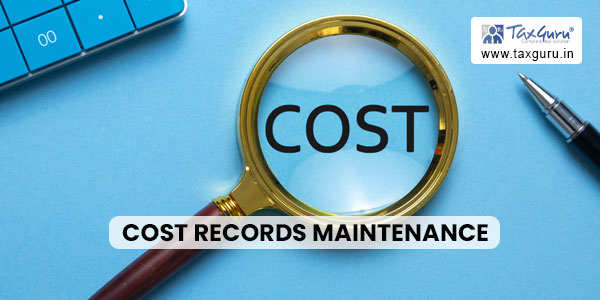Cost Records Maintenance is a critical aspect that often prompts inquiries among accounting and compliance professionals. Questions revolve around turnover criteria, applicability, rules to refer, exemption limits, and how to maintain such records. This guide aims to provide clarity on both the applicability and the process of maintaining cost records, including guidelines and formats as set by the Companies Act.
Page Contents
Cost Records Maintenance – Applicability criteria
According to Section 148 of the Companies Act, Central Government can prescribe the maintenance of Cost Records in respect of Companies producing goods or services as may be prescribed. Central Government has issued the Companies (Cost Records and Audit) Rules, 2014. Rule 3 of these rules, contain two tables. Table A for Regulated Sector and Table B for Non Regulated Sector. These tables contain Name of Industry/Sector/Product/Service and Custom Tariff Act Heading, (wherever applicable). If Company produces goods or provides services given in these tables and its overall Turnover from all products and services is Rs.35 Crores or more, it has to maintain Cost Records.

Foreign Companies defined in section 2(42) of the Companies Act are also covered.
Note: Item No.33 of Table B Production, Import and Supply or Trading of specified medical devices will not apply to foreign companies having only liaison offices.
Exemption from Cost Records Maintenance:
Company classified as a micro enterprise or a small enterprise including as per the Turnover criteria under section 7(9) of the Micro, Small and Medium Enterprises Development Act, 2006.
Applicability of Cost Records Maintenance (Know yourself exercise)
- Is Company producing goods or providing services given in Table A or B?
- Is Company’s Turnover Rs.35 CR or more in the immediately Preceding F.Y.?
- Whether Company is Micro or Small enterprise as per MSMED Act, 2006.
If answer of first two questions is yes and then question of third question is NO, Provisions are applicable.
How to maintain Cost Records
Rule 5 of Companies (Cost Records and Audit) Rules, 2014 deals with maintenance of Cost Records. Important points of this rule are as under:
- Every company to which rules apply, including its all units and branches have to maintain Cost Records in Form CRA – 1.
- Cost Records are to be maintained on regular basis.
- Cost Records should enable the company to exercise control on its operations and costs. Records should also provide necessary data.
Meaning of Cost Records
According to Rule 2 (e ) of the above Rules, “Cost Records “ means books of account relating to utilisation of materials, labour and other items of cost as applicable to the production of goods or provision of services as provided in section 148 of the Companies Act and these rules.
Format of Cost Records
CRA-1 does not contain any format for Cost Records. It contains principles to be followed for different elements of cost. It contains items of costs to be included in Cost Records. Finally, from the cost records we should be in a position to prepare the Cost Sheet of each product separately. As we prepare financial books on regular basis and as an output we are in a position to generate P&L A\C and Balance Sheet at any point of time. Similarly Cost Records are to be maintained on regular basis so that Cost Sheets Product Wise can be prepared at any point of time.
Format of Cost Sheet
Format of Cost Sheet is given in above rules. Main Items of Cost Sheet are Materials Consumed, Utilities, Direct Employee Cost, Direct Expenses, Consumable Stores, Repairs & Maintenance, QC Expenses, R&D Expenses, Technical Knowhow/Royalty, Depreciation, Other Production overheads, Stock Increase / Decrease Effect, Packing Cost, Administrative Overheads, Selling and Distribution Overheads, Finance Cost, Total cost of Sales, Sales Realization and Margin.
Meaning of Utilities
In a Manufacturing Company, generally Power, Water, Steam, Effluent treatment, Oxygen, Nitrogen etc. utilities are consumed. Company may purchase some utilities or it may produce some utilities. Cost sheet for each produced utility should be prepared.
Profit Reconciliation
Profit as per Cost Records do not match with Profit as per Financials due to few reasons like Income from other sources and Income of Purely financial nature are not considered in Costing. Similarly, Expenses of abnormal nature are not considered in Costing, hence Profit Reconciliation is important exercise. It is done at the end of period.
Format of Profit Reconciliation is given below.
Profit Reconciliation (for the Company as a Whole)
| Sr. No. | Particulars | Current Year (Rs.) | Previous Year (Rs.) |
| 1 | Profit or Loss as per Cost Records (Audited and Non Audited Products amount to be shown separately) | ||
| 2 | Add: Income not considered in Cost Records(Details to be given) | ||
| 3 | Less: Expenses not considered in Cost Records(Details to be given) | ||
| 4 | Difference in Stock Valuation between financials and Cost Records | ||
| 5 | Other Adjustments, if any. | ||
| 6 | Profit or Loss as per financials |
Conclusion: Maintaining Cost Records is not only a statutory requirement but also a valuable tool for cost reduction, waste reduction, and resource optimization within a company. The adherence to these practices aligns with legal compliance and aids in more efficient financial management, underscoring the importance of a robust understanding and implementation of Cost Records Maintenance.





